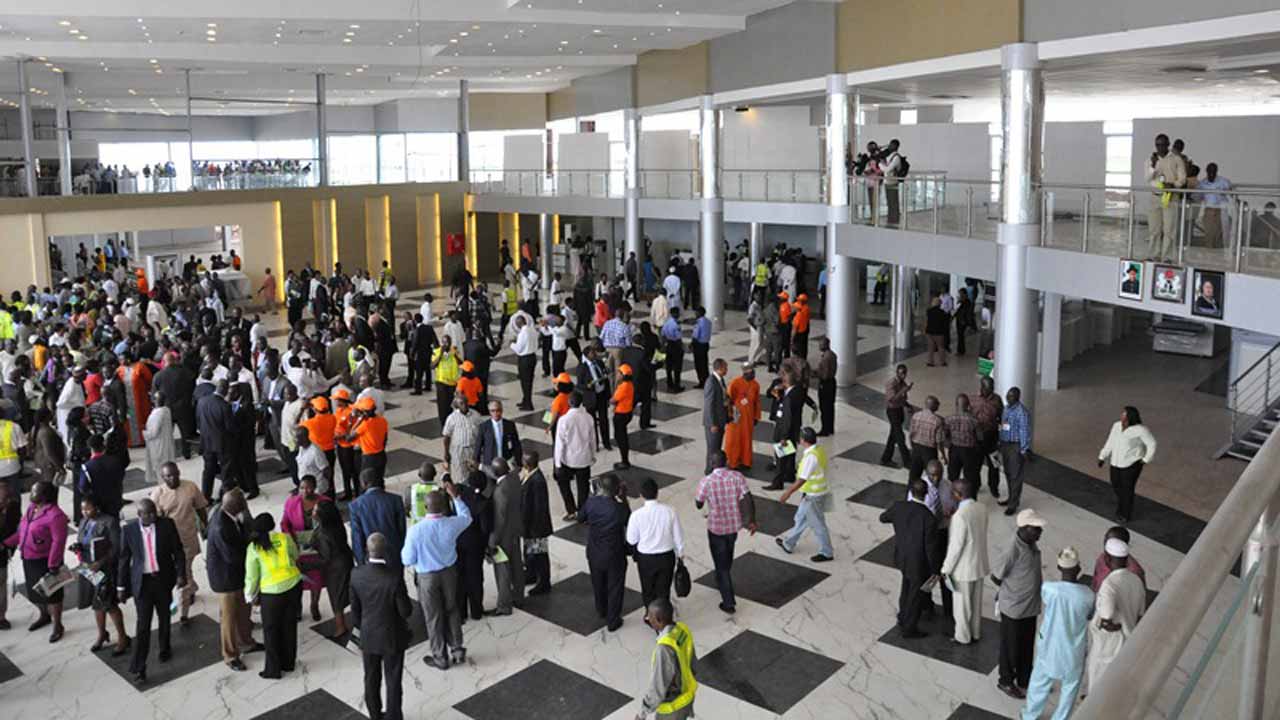Introduction
EXODUS is the tittle of the second book of the Bible’s Old Testament in which the Israelites escaped slavery in Egypt towards the land filled with milk and honey, the Promised Land. The term can also be referred to any sudden departure of a group of people. In this context, “EXODUS” is misplacing the word “Japa” a Nigerian slang that is derived from the Yoruba language meaning “to run away or flee” in hasty manner. It has emerged as a significant socio-economic phenomenon in Nigeria which young Nigerians often use to express their desire or act of leaving the country, particularly for greener pastures or higher quality of life abroad. This article is an attempt to look at this migration trend, examining its causes, implications, the government’s current efforts, possible solutions, and the long-term benefits that could emerge from properly managed migration. It concludes that despite the immediate challenges posed by the exodus of professionals and skilled workers, there exists potential for substantial national development if the government implements effective policies to harness diaspora resources and create conditions favorable for eventual return migration.
A Quick Look at the Current Migration Statistics
There is no gain saying that in the last couple of years, the migration of many young families, middle class, majorly professionals more of doctors, nurses, engineers, and many more has had a very big toll on Nigeria, bringing in sudden gap in the work forces and spaces, especially in the banking and medical sectors. It became more worrisome when military personnel, police officers, court clerks, artisans etc joined the bandwagon and those left simply lack capacity or resources to follow suit.
What we are saying here is that the scale of Nigeria’s current emigration trend is substantial and growing and the figures are very clear for everyone to see to wit;
- According to recent reports by the Nigerian Medical Association over 5,600 doctors left Nigeria for the UK, US, and Canada between 2021 and 2023 alone (available online at: https://www.aa.com.tr/en/africa/over-5-000-nigerian-doctors-fled-abroad-over-poor-conditions-doctors-association-/2992961 accessed 28 April, 2025 at 12:23pm).
- The International Organization for Migration (IOM) Reports in 2024 that approximately 1.7 million Nigerians emigrated between 2020 and 2023, representing about a 70% increase from the previous four-year period.
- The National Bureau of Statistics indicates that 45% of recent emigrants hold at least a bachelor’s degree, with 23% possessing postgraduate qualifications. This highlights the high level of education attainment among Nigerians, particularly those who choose to emigrate.
- In the Tech Industry, observers estimate that approximately 20,000 Nigerian tech professionals have relocated abroad between the year 2020-2023. According to a report from CompTIA, tech occupations across the economy in May 2023 increased by 45,000 jobs, while the unemployment rate for tech occupations decreased slightly from 2.1% to 2%. See BusinessDay: Countries Luring Nigeria’s Tech Talents to Relocate July 4, 2023 available online at https://businessday.ng/technology/article/countries-luring-nigerias-tech-talents-to-relocate/ accessed 28 April, 2025 at 12:38pm. Canada, the United States, the United Kingdom, Australia, and Germany are leading the charge in attracting Nigeria’s brightest minds in the tech sector.
- In the educational sector, academic institutions report losing approximately 12% of their faculty members to foreign universities since 2020. The Minister of Education, Tahir Mamman once said that Nigeria has lost more lecturers than Doctors to the max exodus. See Premium Times: Nigeria Has Lost More Lecturers Than Doctors To ‘Japa’ Syndrome – Minister For Education 4 July, 2024 available online at: https://www.premiumtimesng.com/news/top-news/709768-nigeria-has-lost-more-lecturers-than-doctors-to-japa-syndrome-minister.html?tztc=1 accessed 28 April 2025 at 12:51pm.
It is important to also note that majority of emigrants who left the country are within the middle-class. While some pursue legitimate immigration routes, others attempt to leave the country with the help of travel agents who sometimes defraud them of their hard-earned money leading to financial strain and/or misinformation.
Demographic Profile of Emigrants
The mass exodus has a distinct demographic feature in terms of:
- Age Distribution: Predominantly working-age adults between 25-45 years, representing Nigeria’s most productive workforce segment.
- Educational Background: Disproportionately highly educated, with tertiary education completion rates far exceeding the national average.
- Professional Composition:
- Healthcare professionals (doctors, nurses, pharmacists)
- Technology specialists (software developers, engineers, data scientists)
- Academics and researchers
- Engineers (petroleum, civil, electrical)
- Financial experts (accountants, investment analysts)
- Creative industry professionals
- Geographic Origins: Initially concentrated in urban centers like Lagos, Abuja, and Port Harcourt, but increasingly spreading to secondary cities and even rural areas.
- Destination Countries: Primary destinations include Canada, United Kingdom, United States, Australia, Germany, and increasingly, Middle Eastern nations.
Root Causes of the Mass Exodus
The mass exodus of Nigerians is fueled by a complex interplay of factors, primarily economic hardship, insecurity, and a desire for a better quality of life. Other contributing factors include perceived lack of opportunity, poor governance, and a desire for international qualifications. This push and pull factors are the reasons why people migrate from one place to another. While push factors are negative conditions in the area of origin that force people to leave, the pull factors are positive conditions in the destination area that attract people to move there.
Push Factors: This includes;
- Economic Instability and Uncertainty such as persistent high inflation (reaching over 30% in 2024), currency depreciation affecting purchasing power, high unemployment rates among educated youth, limited career advancement opportunities, income disparities between Nigeria and destination countries and unpredictable economic policies.
- Security Challenges: This has to do with regional insecurity (i.e. Boko Haram insurgency, banditry, kidnapping and so forth), rising crime rates in urban centers, intercommoned conflicts as well as general sense of personal insecurity.
- Infrastructure Deficits: Nigeria has a short fall in essential physical structures and systems needed for a country or region to function efficiently and sustainably. Thus, there is unreliable electricity supply, inadequate healthcare facilities, poor transportation networks, limited access to quality education and insufficient digital infrastructure.
- Governance Issues: The perceived corruption at various government levels, policy inconsistency and implementation gaps, bureaucratic inefficiencies, limited trust in public institutions and political instability and uncertainty in the country.
- Professional Environment Challenges: Such as poor working conditions, particularly in public service, inadequate compensation relative to qualification, limited resources for research and innovation, frequent industrial actions disrupting career progression and limited recognition of professional excellence etc.
Pull Factors:
- Better Economic Opportunities: Higher salaries and better compensation packages, career advancement possibilities, financial stability and predictability and merit-based recognition and progression.
- Quality of Life Improvements: Reliable public services and infrastructure, better healthcare access, improved educational opportunities for children and better work-life balance.
- Global Talent Demand: Active recruitment by developed nations facing skills shortages, special visa programs targeting Nigerian professionals, international recognition of Nigerian qualifications and Growing Nigerian diaspora networks facilitating migration.
- Educational Advancement: Access to world-class research facilities, international exposure and collaboration opportunities, scholarship opportunities and recognition of academic achievements.
Impact of the Mass Exodus on Nigeria
The mass emigration of Nigerians seeking better opportunities abroad, has a significant negative impact on the Nigerian economy, primarily due to brain drain. This loss of skilled professionals hinders economic growth, reduces tax revenue, and can lead to a culture of dependency on remittances amongst other things.
The China and India Migration
In 2024, China’s population estimated to be about 1.419 billion and currently ranked second most populous country in the world behind India which has about 1.461 billion as the projection for 2025 having overtook China since 2022. Presently, India has one of the largest numbers of international migrants in the world with over 18 million living abroad and according to the United Nations World Migration Report, 2024, this makes India the origin country for the largest number of international migrants globally. Estimates from 2024 place the number of overseas Indians at over 35 million which is above the initial 6% of all international migrants globally as indicated in the UN world migration report 2024. China has a significant 10.7 million Chinese who are migrants today, with an estimated 60 million if their descendants are included. This makes China a major source country for international migration ranking third globally after Mexico and Russia. It is important to note that one of the major factors that escalated the migration of Indians and Chinese population was the covid 19 pandemic. This migration rate has greatly impacted the workforce of destination countries such as the United States of America, Canada, UK etc.
Immediate Negative Consequences
- Healthcare System Strain: Increased doctor-to-patient ratios (from 1:3,000 to 1:5,000 in some areas), reduced specialist availability, longer wait times for medical care, quality of care concerns, and rural healthcare access further diminished.
- Educational System Challenges: Faculty shortages at universities, reduced research output and quality, curriculum development limitations, mentorship gaps for upcoming professionals, and educational quality concerns.
- Economic Implications: these include productivity losses in affected sectors, wage inflation for remaining skilled workers, talent acquisition challenges for businesses, reduced competitiveness in knowledge economy, and tax revenue losses.
- Social Consequences: Family separations, demographic imbalances, communal leadership gaps, cultural knowledge transmission disruptions, and reduced civic engagement.
Government Efforts in Addressing the Mass Exodus of Nigerians
Successive Government have made concerted efforts towards addressing the problem in a number of ways to wit-
- Creation of the Nigerians in Diaspora Commission (NIDCOM) and National Diaspora Policy (2021) aimed at giving investment incentives and creating a data base for migrated Nigerians living abroad.
- The national policy on health workforce migration/healthcare workforce retention policy and reciprocal agreements with other nations to ensure that the exchange of health workers benefits Nigeria.
- Provision of academic staff incentives, technology support policies and the establishment of technology hubs and innovation centers across the country.
- Student loan facility programme.
- Increase in the in minimum wage.
These are some of steps so far taken by the government to reduce mass exodus of Nigerians leaving the country in search of greener pastures. Despite all these efforts, the mass exodus of Nigerians has continued to increase with little or no significant change as current data from International Organization for Migration (IOM) puts the population of Nigerians in diaspora at about 17 million in 2024. This makes the country one of the largest in the globe and the biggest diaspora population in Africa.
What then are the Benefits of the Receiving Countries?
The interest and intentions of the migration countries are arguably economical than not. Research reveals that Nigerians contributed a total of 1.93 billion Pounds to the UK economy through payment for education fees in the year 2021. The monies were drawn from Nigeria’s economy. The impact of covid-19 informed the admissions of foreign workers into most of these countries but only the best is accepted to come and work but better come with fees which run in thousands of United States Dollars and/or requires one’s money, skills and knowledge. These in no doubt, created vacuum in so many organizations to say the least. Most painful fact is that most of the Japarians did not give adequate notices of their escape.
But the real joy is coming
The real time implication for Nigeria.
- Employment: Indirectly, the mass exodus contributed to minimal jobs opportunities across the country. The japarians are most times high skill professionals or workers who most of the times suddenly quits their jobs without adequate notices. The organization usually replace with persons who are now privilege to get a new job or a first time job to replace the leaving staff.
- Remittance Economy and Foreign Exchange: Nigeria has become one of the largest remittance recipients in Africa from diaspora, with significant economic implications.The World Bank estimates that formal remittances to Nigeria reached $19.5 billion in 2023, approximately 4.5% of GDP.
- Knowledge Transfer and Skills Acquisition: Nigerian emigrants acquire valuable skills, knowledge, and experiences abroad that can benefit their homeland.Nigeria stands to benefit advanced technical knowledge, international best practices, management expertise, and research capabilities, cross-cultural competencies on the long run.
- Diaspora Investment and Entrepreneurship: The Nigerian diaspora increasingly functions as an economic catalyst in terms of direct investment. The diaspora-led investments in Nigerian businesses reached an estimated $3 billion in 2023.Studies have shown thatreturning Nigerians have founded over 200 companies employing more than 15,000 people since 2020 thereby increasing entrepreneurship. Other critical areas which will benefit Nigeria in this respect are technology transfer, international partnerships and impact-based investment.
- Educational and Professional Network Expansion: The main reason most japarians traveled was for greener pasture but the easier ways are through education. Education will enable them earn higher opportunities both home and abroad. The major advantage to the nation goes to the number of its citizens that acquire quality education, which will rob off on the nation directly or indirectly.
Furthermore, Nigeria will benefit from the expanded global presence through its diaspora. Nigerian academics abroad who often facilitate partnerships between Nigerian and foreign institutions by academic collaborations will also be a huge gain. Professional Associations with specialized networks connecting Nigerian practitioners with global counterparts through mentorship programs, as well as exchange programs providing access to resources, publications, and databases otherwise inaccessible in Nigeria.
- Return Migration and Brain Circulation: The potential return of experienced professionals represents a significant development opportunity which will in turn enhanced human capital, innovation, quality standards advocates, change in leadership mentality and cross-Sectorial Pollination.
- Social Remittances and Cultural Exchange: Beyond money, emigrants transmit ideas, values and practices which will enrich our system in terms of the standard of governance,civic engagementeducational values,cultural ambassadorship and sharpen domestic discourse on development approaches.
Criticisms and Governmental Development
Government all over the world are afraid of criticisms, yet learns most therefrom. In contrast, most of the criticism are passed via insensitive, insulting, and provocative ways that may approximatively land the critic in detention or prosecution and or persecution intimidation. This is irrespective of the successive government regime, politicians being one and same. The diaspora community serves as one of the balancing tools. Through valid criticism of government, they promote standard practices and promote the rule of law. Criticism is a necessary bitter pill which every administration that is intentional about growth, and development must be ready to stomach. It is therefore important for the government to look towards its diaspora community as a source of strength whenever faced with criticism on the issue of mass exodus or japa.
Conclusion
While “exodus” is often viewed as a negative phenomenon, it can also have some positive effects for Nigeria, particularly in terms of economic contributions and future development.
Thus, addressing the problem requires a multi-faceted approach focused on economic stability, improved working conditions, and a shift in societal mindset away from any form of restriction or use of force to prevent people from leaving their country for better countries.
Creating more job opportunities, especially in sectors requiring skilled labor, and enhancing working conditions, and improving the overall living standard is what Nigeria needs.
On the whole, it is our believe that there must be an instrumentalization of failure by re-investment as a concept in this regard. In other words, what many perceive as the negative result or consequences of the failure of successive government could turn out to be a blessing if the present government focuses on creating an enabling environment for all simpliciter.
“The population of every country is a strength to its economic development” – Somadina Eugene Okorie, Esq
SOMADINA EUGENE OKORIE ESQ.,




